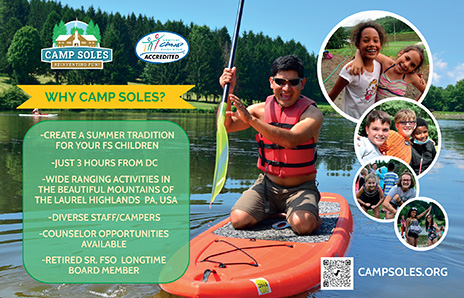From Refugee to Camper to Diplomat: Why Summer Camp for FS Kids
Summer camp can offer a stable anchor in the FS child’s ever-changing world.
BY TIBOR NAGY

Counselor Tibor Nagy (on horseback) teaching riding at Camp Soles in 1971.
Courtesy of Tibor Nagy
I was delighted to learn that The Foreign Service Journal was planning a special summer camp supplement because watching our own children grow up overseas, and having myself spent many years in camping, I have long considered a camp experience an important option for Foreign Service families.
First, a bit of background on how much my own camp experiences have meant in my life. Coming to Washington, D.C., as a political refugee from Hungary in 1957, my family not only did not speak English, but we were also penniless. That summer, our Cooperative for Assistance and Relief Everywhere (CARE) sponsor very graciously paid for me to spend six weeks at Camp Soles, in the spectacular Laurel Highlands of Western Pennsylvania, where I not only learned English, but also social and cultural skills that greatly contributed to my becoming “American” and did wonders for my self-confidence. I returned to the camp each summer, progressing through the stages of camper, counselor and senior staff member until I graduated from college (for which my camp employment helped pay).
Along the way I learned skills in a variety of sports and other activities and gained an appreciation for nature. But, most importantly, I developed leadership and “people” skills and built lifelong friendships that endure to this day. In some of my current speeches, I mention that in my last job as assistant secretary for the Bureau of African Affairs, I had to supervise 48 ambassadors with high levels of self-confidence, but that was nowhere near as difficult as having to manage a group of college-age, but still maturing, counselors!
Strangers in Their Own Land
FS kids are not penniless refugees who need to learn English, but their childhood journeys present challenges similar to my own, and they can equally benefit from a summer camp experience. We all know that uprooting and moving locations every few years generates a long list of stresses—especially for our children, who must first leave behind the familiar and their network of friends, and then start over again with a new locale, a new culture and new people.
The employee enters a known environment from day one, and an accompanying spouse or partner will have a sponsor to help navigate the new terrain, but for the child, everything is unfamiliar. What a summer camp can offer in such an ever-changing world is a familiar anchor from year to year as the child grows—same locale, a known routine, a set of skills that can be expanded each year and, most importantly, a set of friends who can reconnect the instant they see each other.
FS parents may understand the special challenges facing Third Culture Kids—a group that includes all expatriate children. But there is a parallel process that also affects their sense of identity, which parents and extended family members may not be so sensitive to: namely, the rapid cultural changes in the United States related to fashion, music, slang, what’s in/out, etc.
While FS kids may return “home” periodically on home leave or R&R, grandma and grandpa may not be the best ones to help them catch up with changes to Americana since their last visit. Here again, summer camp can play a useful role by providing our TCKs with a “safe space” where they feel comfortable being updated about life in America by trusted friends.
Beyond describing how summer camps can mitigate some of the special challenges FS kids face, I’d like to offer a brief overview of America’s current camp scene and how interested parents can find an appropriate camp.
Types of Camps
Today’s parents have an incredible variety of choices among camps, including whether they are co-ed, or gender specific, age grouped, etc. These include:
- Day Camps: with a full range of activities but no overnight stay.
- Traditional Camps: periods of one or multiple weeks with a wide range of activities, providing opportunities to explore new or developing interests.
- Sports Camps: specializing in just about every sport imaginable, plus skills such as horseback riding.
- Religious Camps: religiously affiliated or denomination-specific.
- Camps affiliated with well-known organizations: scouting, YMCA, etc.
- Arts Camps: drama, music, cooking, film, etc.
- Education Camps: STEM, debate, reading, writing, math, poetry, computer skills, robotics and A/I, etc.
- Special Needs Camps: kids with diabetes, the visually or hearing impaired and those with other disabilities, children who are mourning, etc.
Positive Outcomes
I briefly mentioned how my camp experience helped develop my own life skills, but here is a general list of the types of attributes camps can develop/strengthen:
- A sense of belonging to a community with lifelong friendships.
- The importance of teamwork.
- Positive competition.
- Independence without rebellion.
- Healthy resilience from setbacks.
- A connection with nature and a sense of serenity and mindfulness.
- Expanding comfort zones by learning new skills in safe surroundings.
- Increasing self-esteem through self-reliance.
- Supporting a healthy lifestyle through activities, good nutrition and a “screen free” environment (except for science/computer camps).
- Developing imaginations through a variety of organized and unstructured activities.
Things to Consider
Costs. In general, parents can expect to pay between $300 and $1,000 per week for a traditional overnight camp. Specialized camp costs may be higher, depending on staffing, needs, etc.
When Are Kids Ready? With some camps, age 7 would be the youngest age, but 8 is more common. From my experience as a counselor and staff member, the greatest determining factor is when kids want to go. Forced attendance usually ends in drama and an early departure.
Transition to Staff. For traditional overnight camps, 16 is the usual age limit for campers. From that point, they would move up to counselor in training (CIT) and counselor. Salaries today are quite competitive, and it’s a super job while attending college—especially since camps cover room and board over the summer on top of a salary.
Accreditation. Accreditation by the American Camp Association signifies that the camp’s operations have been thoroughly peer-reviewed, including such critical elements as adequacy of staff training, the quality of the facility, staff emergency preparedness, etc. An ACA review is at least as thorough as an Office of the Inspector General post inspection. Check out www.acacamps.org.
How to Find a Camp? Today, an internet search can take you to any and every accredited camp. The choices can be overwhelming, but here are a few helpful sites:
My wife, Jane, and I wish we had taken the advice I present above and sent our kids to camp for a portion of each summer. Between my in-laws’ farm in Texas and visiting the part of my family who never left Hungary, our summers whizzed by during the more than 20 years we served in Africa. Looking back, we have no doubt that our kids would have had a much easier readjustment to being in the United States if they had had the stable anchor that summer camps can provide.
We are not repeating that mistake with our grandkids and have already started one on her camping adventure. She was absolutely delighted with her first summer at camp and will be joined by the others in 2022. While our grandkids are not all posted overseas as our kids were, gathering at camp each summer will allow the cousins to develop lifelong relationships much stronger than what would come from occasional family gatherings.
I recommend that every Foreign Service family with kids consider a U.S. summer camp as a highly positive tool to help their children develop and nurture essential life skills, self-confidence, lifelong friendships and a sense of being “American.”
Read More...
- “The Impact of COVID-19 on FS Kids: Tips and Thoughts,” by Rebecca Grappo, The Foreign Service Journal, June 2021
- “What About Our Kids?” by Kim Deblauw, The Foreign Service Journal, January-February 2016
- “Stop Feeling Sorry for your Children,” by Ann Miller Morin, The Foreign Service Journal, September 1960





